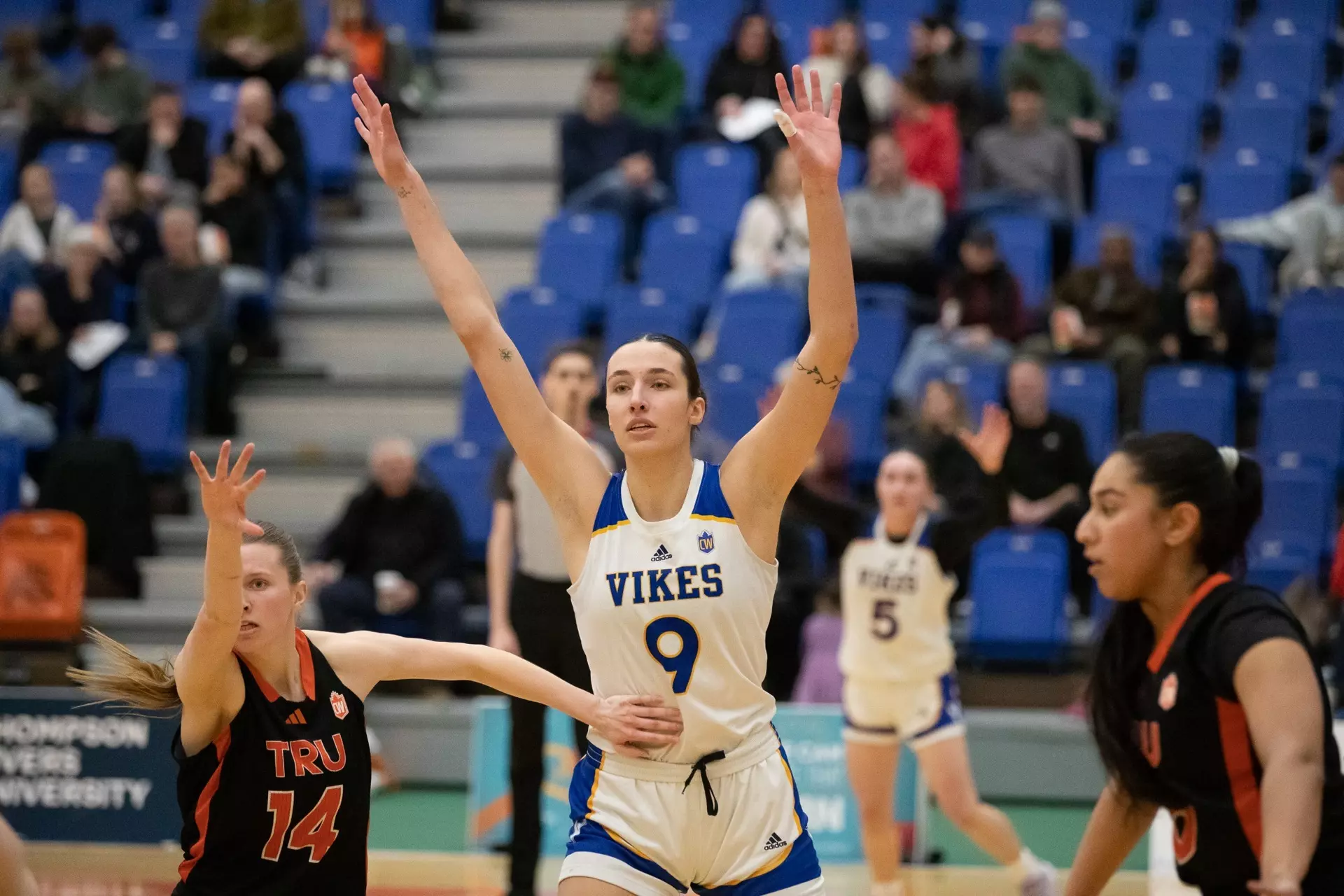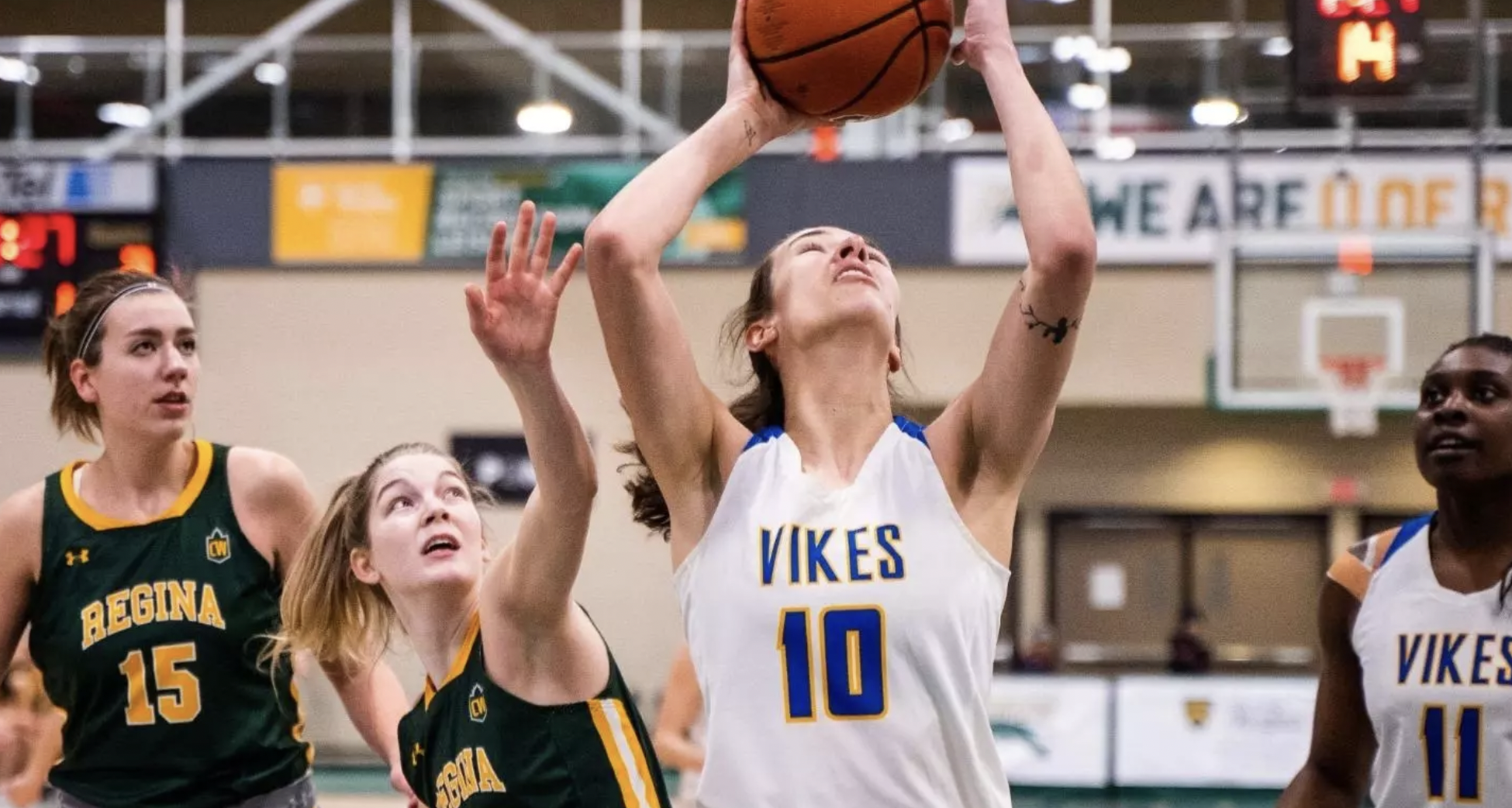Can seniors Becker and Pankratz lead them there?

Photo courtesy of the University of Victoria.
Sometimes, one game can turn the tide of an entire season.
For the Vikes women’s basketball team, that game may have been Jan. 23, when they played host to their rivals from across the Strait of Georgia. Going into the contest, the University of British Columbia (UBC) had a firm hold on first place in the B.C. division. UVic, on the other hand, sat middling in fourth place, having suffered two convincing defeats to UBC in November.
However, to anyone watching the game at CARSA on Jan. 23, one thing was apparent: UVic was ready for a battle. Loose balls sent players from both teams scrambling to the hardwood. Rebounds were ripped out of the air with aggression. And contested drives to the basket drew high-speed collisions and offensive charging fouls.
“UBC was super physical, so being able to show that we’re gritty and we can give that back, but also handle it and still be able to score, is really important for us,” said fourth-year, 6’4” centrer Abigail Becker, who scored a team-high 15 points before fouling out in the fourth quarter.
With Becker on the bench for the remainder of the game, the rest of the Vikes players stepped up, including Tana Pankratz. In the dying moments of the fourth quarter — with UVic down a bucket — Pankratz fought off two UBC defenders to get the ball to Mimi Sigue, who scored with just two seconds left to send the game to overtime. In overtime, Pankratz came up with two massive blocks on defence to help UVic overcome a three-point deficit and eventually win the game 78–75 — handing UBC their second loss of the season.
This season may be the Vikes’ women’s best chance to return to the U Sports Championship tournament since hosting the event in 2017. And the nail-biting finish against UBC — the sixth-ranked team in the country — could be the confidence builder that helps them get there.

Photo courtesy of the University of Victoria.
While contributions from every Vike is critical, there’s a cliché in basketball that coaches often use: our stars need to be our stars. So, let’s be clear: this team goes where Becker and Pankratz take them.
The dynamic duo — who have led the team in scoring over the past two seasons — have played together for the Vikes since 2021–22. However, their individual success as Vikes hasn’t quite yet aligned with team success.
In 2021–22, Becker was a first-year player and coming off the bench, while Pankratz, a year older, was in her sophomore season and averaging an impressive 15 points per game until she dislocated her knee and underwent surgery. The following season, when Becker stepped into a starting role with the team, Pankratz fought hard to rehabilitate her knee and make a comeback partway through the season. But only three games into Pankratz’ return to action in November 2022, the worst-case scenario happened. Pankratz reinjured the same knee, and was out for the season once again. That year, the Vikes ended with a 9–12 record, and failed to qualify for the Canada West playoffs.
“It was a really tough time for me. You feel disconnected from the team, because it’s easy to isolate yourself when you’re injured. But I wanted to contribute any other way I could,” said Pankratz.
Even when she was out, Pankratz’s basketball IQ and feedback to her teammates and coaches was “super integral on the sideline,” said Becker.
“I learned to watch my teammates’ tendencies more closely and see where and when they wanted the ball — which actually really helped when I came back after my injury,” said Pankratz.

Photo courtesy of the University of Victoria.
Fast forward to 2023–24, with Pankratz healthy and the duo finally together for a full season, the team won 10 of their final 14 games to overcome a slow start to the season and qualify for the Canada West playoffs, where they knocked out UBC in the quarterfinals (the second ranked team in the country). Although UVic ultimately came a game short of qualifying for the U Sports national Championships, the long-awaited Canada West playoff run was a sign of things to come.
“People called our run in the playoffs last season a ‘Cinderella story,’” said Pankratz. “But we knew what we were capable of.”
Becker’s and Pankratz’s paths to basketball and to UVic are markedly different.
Raised in Abbotsford, Pankratz grew up with basketball all around her. Both her parents played at Fresno Pacific University in California, while her older brother JJ played collegiate ball at Simon Fraser University.
“We had a rule that [JJ] wasn’t allowed to block me,” joked Pankratz, referring to the countless pickup games her family played together in front of her childhood home.
Pankratz began playing basketball in Grade 2 and was coached by her dad until high school, where she became a highly recruited player by both Canadian and American universities.
“I had six or seven NCAA offers, but I couldn’t see myself moving so far away. UVic was the perfect balance of being far enough away to have some independence, but still close to home,” said Pankratz.
Basketball didn’t come quite as naturally for Becker, who said she was encouraged to play the sport in Grade 6 because of her height, but got frustrated when she “wasn’t good at it right away.”
“I decided I hated it,” laughed Becker.
Even after giving basketball another chance in Grade 9 when she joined her school team in Parksville, Becker still didn’t feel a connection to the game: “I still didn’t really enjoy it. I just thought it was fine.”
The shift came after her coach sent her to a UVic initiative for young athletes called Vikes for a Day. Becker got the opportunity to meet the Vikes women’s team, practice alongside them during a morning shootaround, and then sit on the bench during their game that evening.
“It really inspired me,” recalled Becker. “That was the day I decided to start taking basketball more seriously.”
That summer, Becker joined the B.C. provincial basketball team for her age group, and her development took off.
Though Becker’s family never played basketball at the competitive level like Pankratz’s family did, it’s safe to say they’re big fans now — especially of the Vikes.
“My [younger] brother is a super big fan of [the] team. He has posters that we get every year up on his wall, which is super cute,” said Becker, her smile almost audible over the phone.
On the court, it’s each player’s unique skill set that makes them so effective together. Becker is the dominant center, who does her damage tight to the basket. Last season, her length, along with incredible efficiency, led to her recording the second-highest field goal shooting percentage in the entire Canada West conference.
“I know I can lob it up to her, and she’s going to be there,” said Pankratz, of Becker’s ability to turn a possession under the basket into an easy bucket.
Pankratz, on the other hand, does a bit of everything. As a 6’3” guard who moves the ball up the court, facilitates her teammates, and has some serious shooting range (Pankratz leads the team in three-point field goal percentage this season), she’s an absolute nightmare matchup for opponents.
“She’s so dynamic and athletic,” said Becker of Pankratz. “And with our height, it just makes it so much easier — when it’s a 6’3” [player] passing into [me] over top of everybody else.”
Pankratz’s all-around game was on display Jan. 23, during the thrilling overtime win against UBC. Though her shooting efficiency that evening was less than her season average, Pankratz packed the rest of the stat sheet with four rebounds, three steals, four assists, and five blocks — which tied for the most blocks in a single Canada West game this season.
Pankratz is one of two co-captains (along with fourth-year player Meike Boerstra), but Becker says the Vikes’ leadership comes from a number of voices on the team.
“We’re all pretty good at checking in with each other during games and practices,” said Pankratz.
Providing honest feedback to each other is something the team actively works on.
“I feel that in some women’s sports, it’s kind of awkward to give your teammates feedback without it feeling somewhat personal,” said Becker, who acknowledged that power dynamics between older and younger players makes open communication even more important.
“But if I can give it to Tana and Tana can give it to me, then, you know, the younger girls can also take it and give it back to us too,” Becker said.

Photo courtesy of the University of Victoria.
Open and honest communication, however, needs to coincide with trust to be effective. While some varsity sports teams try to encourage or even manufacture player relationships and trust through “team building” activities and events, Becker prefers less-structured, more genuine forms of connecting with her teammates.
“[I’d rather] invite a [teammate] for coffee or lunch, or something like that is casual, and build rapport through that,” said Becker.
While it is still to be determined whether the win against UBC on Jan. 23 has truly turned the tide on the season for the team, one thing is certain: this will be Pankratz’s and Becker’s final season playing together.
Becker, unlike Pankratz, has one more year of eligibility, but being able to qualify for the U Sports Championships tournament — held this March in Vancouver — would be a perfect cap to their tenure together as Vikes.
For now, Pankratz and Becker will continue to battle with their teammates down the stretch of the final few games of the regular season.
“Our goal is to finish as one of the top two teams in the B.C. division,” said Pankratz. Doing so would allow the Vikes the opportunity to host a quarterfinal Canada West playoff game, slated for Feb. 22, and move one step closer to nationals.
The Vikes’ next home games take place on Feb. 7 and 8 against Thompson Rivers University. Tickets can be found here.







